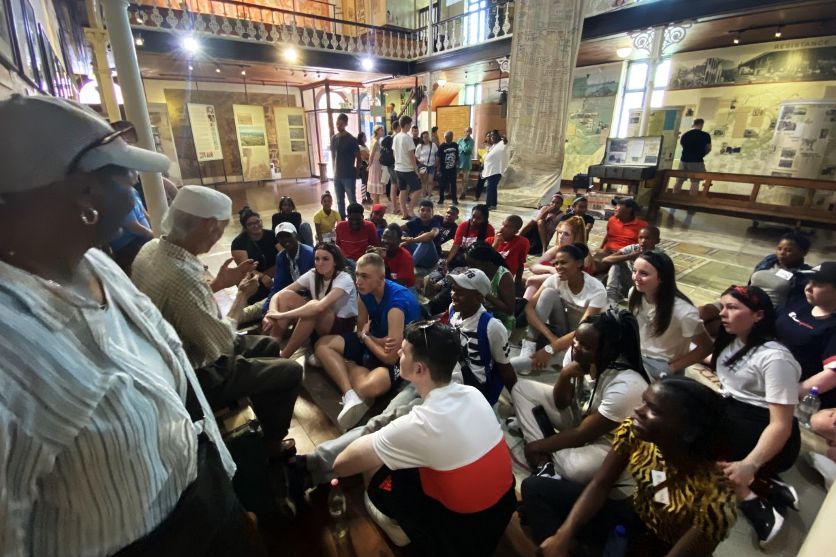Lessons for Change: The Importance of International Alliances for Local Activism
PPR's Seán Brady reflects on the importance of international solidarity with activists from around the world, in order share strategies.
Over recent years - while continuing to organise campaigns with communities in places like Belfast, Edinburgh and Cork - PPR have been exploring ways to act in solidarity with sister organisations and struggles across the globe. In Ireland, Scotland, England, the USA and South Africa we have developed lasting bonds of friendship and camaraderie that are informing how we act locally and use what resources and influence we have to support others operating in repressive and oppressive environments.
We are collectively enduring a global pandemic event, in a global economic reality where powerful corporations can dictate national politics.
The Covid-19 pandemic has demonstrated the necessity of international cooperation and a respect for human rights above narrow self-interest and policies which endanger public health and safety. Many leaders such as Trump, Johnson and Bolsonaro are responding by cynically conflating the public interest with the financial self-interest of key economic actors while other leaders are caught in the dilemma of trying to respond to a crisis with a public sector weakened by decades of privatization and austerity. In this context, with other global threats such as climate collapse upon us, connecting with people in solidarity across continents to help each other becomes a necessity. If our activism is informed only by the local, we ignore real power and a world of possibilities and solutions.
In recent weeks, due in large part due to the Covid-19 lock-down, we have drawn on our international relationships and the valuable experience of people living in Dublin, Belfast, Cork, Galway, Edinburgh, London, Cape Town, Johannesburg, New York and other cities and towns.
The age of the Internet and a proliferation of digital tools have created powerful platforms from which to resist human rights abuses and build alternative movements, institutions, technologies and relationships which reject exploitative practices and regimes in favour of humane alternatives.
Covid-19 has accelerated our plans to develop better and more ethical tools to reach beyond the limits of our restrictive national borders for support and offer what we can in return.
The necessity of connecting online during the pandemic has given us a better taste of the possibilities of international cooperation and an understanding of how little these digital tools are being exploited to their fullest potential by social justice movements and the activists who drive them. We in PPR are no exception – our capacity has been limited mostly by habits, culture and practice, not resources. Covid-19 has accelerated our plans to develop better and more ethical tools to reach beyond the limits of our restrictive national borders for support and offer what we can in return.
We have participated in international seminars, debates, workshops and training sessions to enrich our activism and discover new networks, constituencies and expertise. This coalition building has been invaluable for the groups we are organising with – the homeless, the unemployed, the sick, disabled, mental health service users, refugees and asylum seekers.
With the support of organisations like the Social Change Initiative and The Bertha Challenge we have been able to travel and learn from activists groups all over the world.
In 2018 PPR activists concluded solidarity tours of the USA and South Africa. The interviews we conducted with activist groups on our travels are available on the Lessons For Change website which was launched during a series of powerful events at Feile an Phobail.
In September last year, PPR activists travelled to South Africa to participate in a direct action Zombie March to learn from and support Reclaim The City - a campaign by homeless families and activists which is currently occupying vacant land and property to build communities in Cape Town. They are under threat of eviction at the minute by the South African authorities.
In February this year we worked in partnership with the Tshisimani Centre and Clonard Youth Club to deliver a week long development program in Cape Town for over 50 young people from Belfast and South Africa. Many of these young South Africans are now suffering threats of eviction alongside food, water and power shortages during the pandemic.
In March we were joined in Belfast by the Yes Men - international pranksters whose hallmark is infiltrating high profile events to expose corporate greed and government corruption. The Yes Men used tactics in support of the Build Homes Now campaign that are rarely used by local NGO’s and community groups where funding relationships and legal threats by private power can often suppress democratic practice and challenge.
Since lock-down began we have been working with South African activists living and organising in harsh conditions - resisting brutal evictions and violence perpetrated by the South African Government - to offer what support we can to help raise funds, tell the story and build pressure.
Now more than ever we want to strengthen our bonds with activists engaged in similar struggles for a better world in other regions. If you have ideas or want to know more about our work contact us!